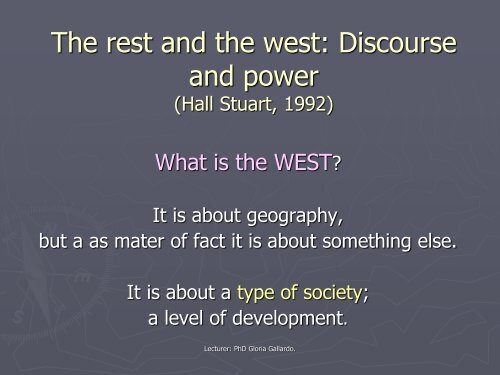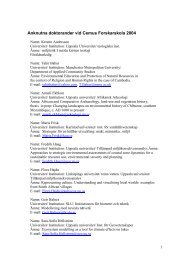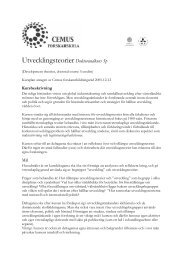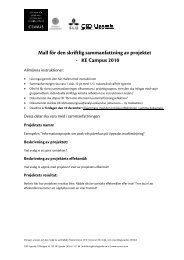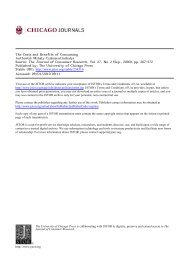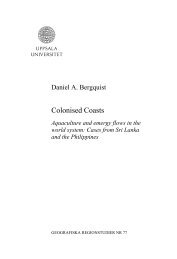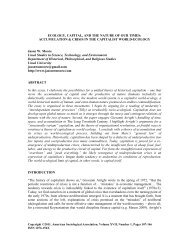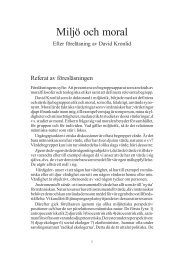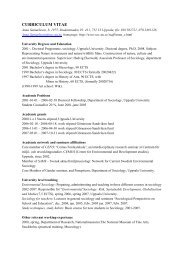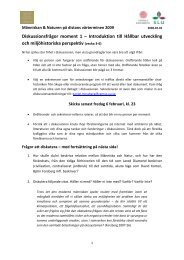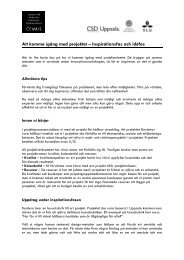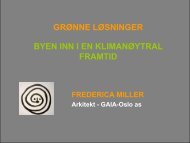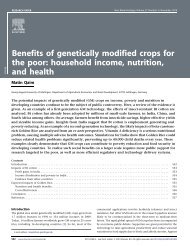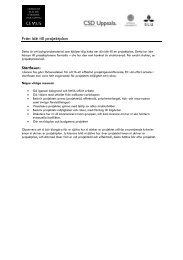III The West and the..
III The West and the..
III The West and the..
- No tags were found...
Create successful ePaper yourself
Turn your PDF publications into a flip-book with our unique Google optimized e-Paper software.
<strong>The</strong> rest <strong>and</strong> <strong>the</strong> west: Discourse<strong>and</strong> power(Hall Stuart, 1992)What is <strong>the</strong> WEST?It is about geography,but a as mater of fact it is about something else.It is about a type of society;a level of development.Lecturer: PhD Gloria Gallardo.
<strong>West</strong> as Development<strong>The</strong> <strong>West</strong> as implying Development started in <strong>West</strong>Europe, but it embraces geographically muchlonger than Europe’s border.It does not include East Europe, but on <strong>the</strong> contraryit includes USA <strong>and</strong> Canada, New Zeel<strong>and</strong> <strong>and</strong>Australia.<strong>The</strong>refore <strong>the</strong> WEST is much more than geography,it is about an idea; it is what Hall calls aHistorical Construction.Lecturer: PhD Gloria Gallardo.
With <strong>West</strong> we mean in o<strong>the</strong>r words, a type ofsociety that has <strong>the</strong> following characteristics:1. It is developed2. Industrialized3. Urbanized4. Capitalist5. Secular, <strong>and</strong>6. ModernLecturer: PhD Gloria Gallardo.
<strong>The</strong> <strong>West</strong> is, in o<strong>the</strong>r words,synonymous with modernity,<strong>and</strong>logicallyantonymousof backward, underdevelopedLecturer: PhD Gloria Gallardo.
<strong>The</strong> concept has several functions:1. It allows us to classify <strong>and</strong> characterizesocieties according to different categories,<strong>West</strong> <strong>and</strong> non-<strong>West</strong>.It is, in o<strong>the</strong>r words, a device with whose helpwe thinkLecturer: PhD Gloria Gallardo.
Picture2. It is a picture, it condensates diversecharacteristics into a single picture. It worksas a ”system of representations”Ex: <strong>West</strong>=urban=developednon-<strong>West</strong>= rural, underdevelopedLecturer: PhD Gloria Gallardo.
Model3. It provides us with a st<strong>and</strong>ard ofcomparison.It allows us to compare differentsocieties; it helps to explain differencesLecturer: PhD Gloria Gallardo.
Ideology4. It provides us with criteria for evaluationaccording to which o<strong>the</strong>r societies areranked positively or negatively.In o<strong>the</strong>r words, it functions as Ideology.Lecturer: PhD Gloria Gallardo.
<strong>The</strong> <strong>West</strong>: a historical constructionWhen <strong>the</strong> <strong>West</strong> concept was establishedit becamean organising factorwithin asystem of global power relations,organising our way of thinking <strong>and</strong> talking.Lecturer: PhD Gloria Gallardo.
<strong>The</strong> idea of <strong>West</strong> existed already in <strong>the</strong> idealsof <strong>the</strong> Enlightenment.<strong>The</strong> Europeans thought that <strong>the</strong> Europeansocieties were <strong>the</strong> most developed in <strong>the</strong>world <strong>and</strong> <strong>the</strong>y considered <strong>West</strong> as a resultof an INTERNAL development.Lecturer: PhD Gloria Gallardo.
Hall means that <strong>the</strong> emergence of <strong>the</strong> <strong>West</strong> isat <strong>the</strong> same time a global history<strong>The</strong> <strong>West</strong> <strong>and</strong> <strong>the</strong> Rest became two sides of<strong>the</strong> same coin.<strong>The</strong> <strong>West</strong> becomes in relation to <strong>the</strong> Rest.One find <strong>the</strong> unique in relation to that whichis different in o<strong>the</strong>r cultures.Lecturer: PhD Gloria Gallardo.
This is to say that <strong>the</strong> significance or meaningdepend on <strong>the</strong> relationships that existbetween different terms within a system ofmeanings.This is about Saussure’s <strong>the</strong>ory of binary(dichotomy) oppositionsThings have no meaning in <strong>the</strong>mselves,but only in relation to o<strong>the</strong>r things.Lecturer: PhD Gloria Gallardo.
What kind of role played <strong>the</strong>n <strong>the</strong> Restfor <strong>the</strong> formation of <strong>West</strong>ern identity?Both became part of <strong>the</strong> same discourse;<strong>the</strong>y became parts of a global, social,economic <strong>and</strong> cultural system;of an inter-dependent world;of a language.Lecturer: PhD Gloria Gallardo.
In that discourse one choose to see that <strong>the</strong>Rest or <strong>the</strong> <strong>West</strong> are not homogenous.This simplify our world, <strong>and</strong> here we find <strong>the</strong>value of concepts.Observe that I am not putting any value to<strong>the</strong> binary opposition <strong>West</strong>/Rest.I am referring to <strong>the</strong> idea of Binaryoppositions of Saussure.Lecturer: PhD Gloria Gallardo.
Historical retrospectiveHow did <strong>the</strong> process started?In order to get a view we must use somebroad chronologies <strong>and</strong> historicalgeneralizations with Europes’ history,which at <strong>the</strong> same time is also<strong>the</strong> history of <strong>the</strong> Rest.Lecturer: PhD Gloria Gallardo.
Europe’s expansion<strong>The</strong> European expansion coincides with <strong>the</strong>end of feudalism <strong>and</strong> <strong>the</strong> beginning of <strong>the</strong>modern era.Two successes play an important role:1. <strong>The</strong> expansion of Portugal to Africa2. <strong>The</strong> expansion of Spain into <strong>the</strong> so called newworldLecturer: PhD Gloria Gallardo.
We can distinguish 5 phases within<strong>the</strong> expansion process:1. <strong>The</strong> exploration process when Europediscover <strong>the</strong> new world; <strong>the</strong> time of <strong>the</strong>slavery begins.2. Conquer <strong>and</strong> colonization of <strong>the</strong> new world<strong>and</strong> of o<strong>the</strong>r parts of <strong>the</strong> world begins.3. Production process in different parts of <strong>the</strong>world <strong>and</strong> export to Europe develops (ex.sugar <strong>and</strong> cotton plantations).Lecturer: PhD Gloria Gallardo.
4. A climax in <strong>the</strong> economic expansion isreached <strong>and</strong> <strong>the</strong> struggle for <strong>the</strong> colonies<strong>and</strong> markets among different Europeanpowers start, which finally leads to I WorldWar.5. From <strong>the</strong> 1960s forward most colonies get<strong>the</strong>ir independence.Lecturer: PhD Gloria Gallardo.
EUROPEANSIt seems that <strong>the</strong> first time <strong>the</strong> denominationEuropean was used was in <strong>the</strong> 8th centuryin connection with a victory over Islam.At <strong>the</strong> same time that Europe distinguishesitself against <strong>the</strong> Rest, Europe become moreintegrated.An important factor in that integration wasChristianity. Under many centuries Europewas synonymous of ChristianityLecturer: PhD Gloria Gallardo.
What is a discourse?A discourse is a coherent or rational body ofspeech or texts.In a sociological sense, a discourse is a way ofrepresenting something .It is a way of constructing a subject in such away that precludes o<strong>the</strong>r ways ofconstructing it.Lecturer: PhD Gloria Gallardo.
Discourse formationsAffirmations or opinions consists of whatFoucault callsDiscourse formations,i.e.,it is about many affirmations <strong>and</strong> <strong>the</strong>seaffirmations are congruent with each o<strong>the</strong>r.Lecturer: PhD Gloria Gallardo.
Production of knowledgeDiscourse formation has to do with <strong>the</strong>production of knowledge via language,i.e,mediated by language,but it is produced through practice.A discoursive practice is <strong>the</strong> practice ofcreating or producing meanings.Lecturer: PhD Gloria Gallardo.
<strong>The</strong> <strong>West</strong> <strong>and</strong> <strong>the</strong> Rest<strong>The</strong> discourse about <strong>the</strong> <strong>West</strong> <strong>and</strong> <strong>the</strong> Rest wasmade through practice,i.e,through how <strong>the</strong> <strong>West</strong> behaved against <strong>the</strong> Rest.Even though we don’t accept <strong>the</strong> discourse about<strong>the</strong> <strong>West</strong> <strong>and</strong> <strong>the</strong> Rest, we are trapped in thatposition that says that <strong>West</strong> is SUPERIOR to <strong>the</strong>Rest.Lecturer: PhD Gloria Gallardo.
Discourses are not closed systems, but <strong>the</strong>ycan borrow elements from o<strong>the</strong>r discourses<strong>and</strong> <strong>the</strong>y link different discourses.For example:<strong>The</strong> discourse about <strong>the</strong> <strong>West</strong> is built upon<strong>the</strong> discourse about Christianity.Lecturer: PhD Gloria Gallardo.
Discourse <strong>and</strong> ideologyFoucault introduces a fundamental differencebetween ideology <strong>and</strong> discourse.Ideology st<strong>and</strong>s in sociological terms for aset of statements or beliefs, which producesbiased knowledge that serves <strong>the</strong> interest ofparticular groupsLecturer: PhD Gloria Gallardo.
Foucault discards this conception of ideology,preferring to use <strong>the</strong> concept ofdiscourseinstead of that of ideology as this rests on adistinction between:►true statements, for which science st<strong>and</strong>s,<strong>and</strong>►false statements, represented by ideologyLecturer: PhD Gloria Gallardo.
Within this view of ideology, facts would be those thatmake <strong>the</strong> difference, helping us to decide betweenwhat is true <strong>and</strong> what is not.Foucault undermines <strong>the</strong> distinction between true <strong>and</strong>false statements, rejecting this separation,► first, because statements are seldom white or black,true or false.► Second, facts are socially constructed <strong>and</strong> mediatedby language.As such facts are value ladden, bearing ideologicaldimensions that in practice decide what is true orLecturer: PhD Gloria Gallardo.false
How do we solve <strong>the</strong> dilemma aboutwhich discourse is true (science) orfalse (ideology)?Sociologists know that our values comes inwhen we describe <strong>the</strong> social world <strong>and</strong> thatall affirmations about facts have anideological dimension.Lecturer: PhD Gloria Gallardo.
KnowledgeWhat Foucault says is that “knowledge” is <strong>the</strong>result of <strong>the</strong> struggle between 2 differentdiscourses.It is <strong>the</strong> results that decides what is <strong>the</strong> falsetrue.<strong>The</strong> side that wins owns <strong>the</strong> “truth”. It is ino<strong>the</strong>r words, a question of power.Lecturer: PhD Gloria Gallardo.
Power produces knowledgeThat is why Foucault says that we must accept that it ispower that produces knowledge.A question:Can discourse be innocent?NoWhy?Because we construct <strong>the</strong> discourse with language as adevice, <strong>and</strong> <strong>the</strong>refore language become <strong>the</strong> normLecturer: PhD Gloria Gallardo.against which we measure <strong>the</strong> Rest.
Europeans encounter <strong>the</strong> new world with owncategories <strong>and</strong> classify <strong>the</strong> environmentaccording to own norms.Obviously different Europeans powers haddifferent interest goal <strong>and</strong> strategies <strong>and</strong> <strong>the</strong>semight contradict each o<strong>the</strong>rLecturer: PhD Gloria Gallardo.
For example, different groups/institutions in Spainhad different goals <strong>and</strong> discourses for <strong>the</strong>Americas:► appropriate gold <strong>and</strong> silver (commercial groups)► put <strong>the</strong> continent under <strong>the</strong> Spanish Crown(<strong>the</strong> Crown), <strong>and</strong>.► convert <strong>the</strong> so called Indians to Christianity(<strong>The</strong> Church).Lecturer: PhD Gloria Gallardo.
Discourse are not ei<strong>the</strong>r innocent because <strong>the</strong>meeting between Europeans <strong>and</strong> <strong>the</strong> Rest was notbetween equals, but <strong>the</strong> Europeans were in aposition of POWER against <strong>the</strong> natives.According to Foucault <strong>the</strong> discourse implies alwayspower <strong>and</strong> discourses are one of <strong>the</strong> systemthrough which power circulates.<strong>The</strong> knowledge produced by discourses consist of atype of power that is exercised upon those thatare <strong>the</strong> object of knowledge.Lecturer: PhD Gloria Gallardo.
Truth/false,science/ideologyThrough his way of looking at discourse ,Foucault undermines <strong>the</strong> distinctionbetween <strong>the</strong> truth <strong>and</strong> <strong>the</strong> false, or betweenscience <strong>and</strong> ideology.When power operates in such a way that itforces up its truths, <strong>the</strong>n that discourseformation produces a ”Truth Regime”Lecturer: PhD Gloria Gallardo.


